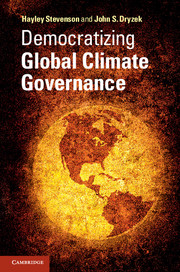Book contents
- Frontmatter
- Contents
- List of Tables
- Preface
- Acknowledgments
- List of Acronyms
- 1 The challenge of global climate governance
- 2 Global climate governance as a deliberative system
- 3 Governance with and without institutionalized authority
- 4 Authoritative global governance
- 5 Emerging centers of networked authority
- 6 Transmitting public concerns in the deliberative system
- 7 Accountability
- 8 Improving the global deliberative system
- 9 Conclusion
- References
- Index
5 - Emerging centers of networked authority
Published online by Cambridge University Press: 05 June 2014
- Frontmatter
- Contents
- List of Tables
- Preface
- Acknowledgments
- List of Acronyms
- 1 The challenge of global climate governance
- 2 Global climate governance as a deliberative system
- 3 Governance with and without institutionalized authority
- 4 Authoritative global governance
- 5 Emerging centers of networked authority
- 6 Transmitting public concerns in the deliberative system
- 7 Accountability
- 8 Improving the global deliberative system
- 9 Conclusion
- References
- Index
Summary
Introduction
The move from “government” to more networked “governance” appears to be a general trend in today’s world, applying within countries as well as internationally, on climate change issues no less than elsewhere. Networked governance in this context implies questioning the assumed primacy of hierarchically organized formal public authority in favor of recognizing more informal, horizontal connections across actors who can produce collective outcomes without legislation or treaty (Bevir and Rhodes 2003). Networks as opposed to hierarchy or competition are therefore central. The emergence of networked governance is in large part an adaptive response to complexity, as the various dimensions of an issue elude the cognitive capacities and enforcement capabilities of centralized government. Sometimes governments recognize their own limitations and so set up networks, producing what Bell and Hindmoor (2009) call state-centered governance. Leadership by the state is generally unavailable when it comes to transnational networks, though as we shall see, international organizations can sometimes take leadership roles.
Climate change at all levels, from the local to the global, exemplifies problem complexity, and so it should be no surprise to see networked forms emerging here as much as in any other kind of issue area. Climate governance networks can involve the transfer of technology, the organization of carbon trading, or sometimes just exchange of information, ideas, and pledges about what will be done. Their participants include corporations, non-governmental organizations (NGOs), community groups, foundations, departments of local and national governments, and international organizations. There is a particular reason why the global governance of climate change should be conducive to the emergence of these forms, and that is the impasse we see in the peak-level global negotiations of the United Nations Framework Convention on Climate Change (UNFCCC). Hoffman (2011) represents an enthusiastic take on the emergence of these alternatives, from the local to the global, from individual “transition towns” to the Global Greenhouse Gas Register. Yet while it is easy to praise such forms on the grounds that they are multiple, varied, and full of promise, they merit more serious scrutiny – not just the assumption that because the UNFCCC process has multiple failings, networked governance would have to be better.
- Type
- Chapter
- Information
- Democratizing Global Climate Governance , pp. 86 - 119Publisher: Cambridge University PressPrint publication year: 2014



